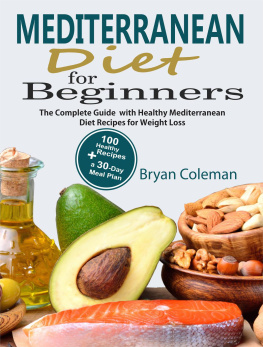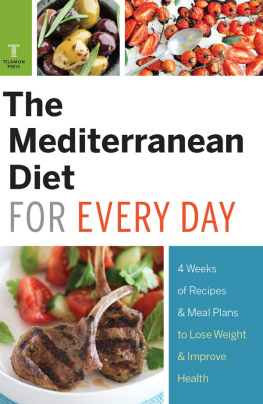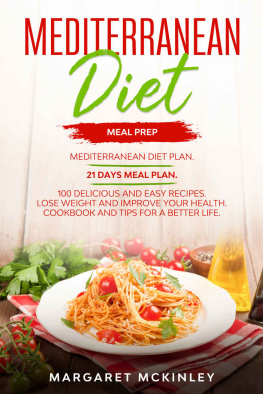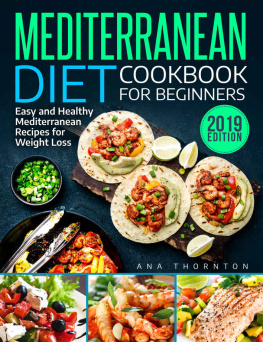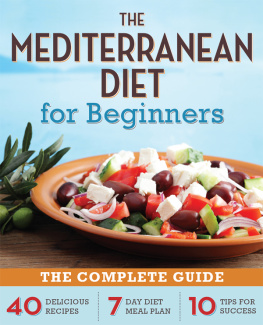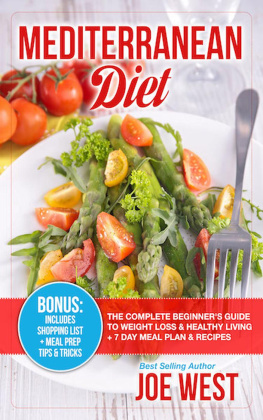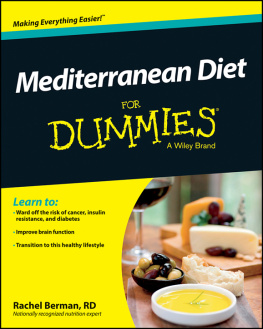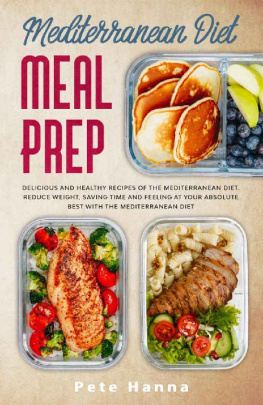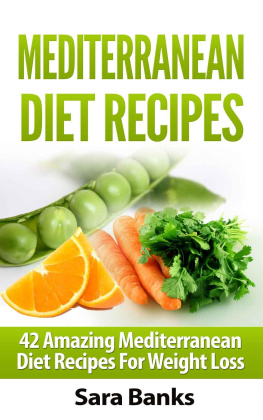Mediterranean Diet for Beginners The Complete Guide and 30-Day Meal Plan with 100 Healthy Mediterranean Diet Recipes for Weight Loss Bryan Coleman Copyright 2019 Bryan Coleman All rights reserved. No part of this publication may be reproduced, distributed, or transmitted in any form or by any means, including photocopying, recording, or other electronic or mechanical methods, without the prior written permission of the publisher, except in the case of brief quotations embodied in critical reviews and certain other noncommercial uses permitted by copyright law. Limit of Liability/Disclaimer of Warranty: While the publisher and author have used their best efforts in preparing this book, they make no representations or warranties with respect to the accuracy or completeness of the contents of this book and specifically disclaim any implied warranties of merchantability or fitness for a particular purpose. No warranty may be created or extended by sales representatives or written sales materials. The advice and strategies contained herein may not be suitable for your situation. You should consult with a professional where appropriate.
Neither the publisher nor author shall be liable for any loss of profit or any other commercial damages, including but not limited to special, incidental, consequential, or other damages.
Content
T he Greeks and Italians benefitted from whole foods and physical activity that made them less susceptible to diseases and remarkably healthier compared to other people. Research shows that the Mediterranean diet is associated with weight loss, long life, lower susceptibility to Alzheimer's and Parkinson's diseases, decreased risk of heart diseases, lower cholesterol, prevention of type II diabetes, strokes and heart attacks. Also, the Mediterranean diet also decreases the risk of anxiety, depression and certain cancers. The Mediterranean diet is based on the long-established customary foods of the countries bordering the Mediterranean Sea. The origin of this phenomenal diet dates back to as early as the 1960s.
Instead of a strict plan or a finite rule, it is a lifestyle that stresses the consumption of whole foods and the need for physical activity. The Mediterranean diet lays emphasis on the consumption of fish, legumes, whole grains, veggies, fruits and olive oil. Poultry and eggs can be eaten infrequently, but then again processed foods and red meats should be avoided as much as possible. Moderate amounts of fermented diary can be consumed on a regular basis, in addition, red wine should be consumed responsibly. The Mediterranean Diet for Beginners contains a comprehensive guide to the Mediterranean diet and 100 delicious recipes for weight loss and a healthy life. This book will serve as a kick-start guide to help you get started on the Mediterranean diet to suit your preferences and specific wants.
You will discover a diet that will help you make little or major changes towards a healthier life. The recipes in this book includes complete nutritional information to guide you as you cook your way to health. Also, this section contains a 30-day meal plan. Feel free to modify your food choices and portions based on your own preferences and needs.
T he Mediterranean diet is a straightforward diet with a simple approach. The concept is to copy the way of eating of the Mediterranean people.
When uncertain, a simple formula to follow on the diet is to make a quarter of your plate - healthy protein, a quarter of your plate - whole grains, and the remaining half of your plate - vegetables and fruits. That is to say, a Mediterranean diet plate is divided into 3 parts (1/4 healthy protein, 1/4 whole grains and 1/2 veggies and fruits). Here are some extra tips to get you started: Avoid Processed Foods Whole foods such as fish, legumes, nuts, whole grains, veggies, fruits and olive oil are the core of the Mediterranean diet. Consume whole foods that are beneficial to your body and health, and steer clear of processed foods to avoid violating the healthy principles of the Mediterranean diet. Eat Fish Instead of Red Meat The major supply of protein on the Mediterranean diet are fatty fish such as herring, tuna, mackerel and salmon. These fish are loaded with astronomical amounts of omega-3 fatty acids which improves cholesterol levels and reduces inflammation.
Lean Protein sources, such as shellfish and white fish are also a good addition to your meals. Yogurt, cheese, eggs, turkey and chicken can be eaten daily or weekly in moderation. Lastly, you should avoid eating processed meats and red meats. Consume More Veggies and Fruits On the Mediterranean diet, veggies and Fruits should be the major portion of each meal. The Mediterranean diet recommends the consumption of 7-10 servings of veggies and fruits daily. Come up with creative ways to add more veggies and fruits to your meals, such as eating apple with nut-based butter for a snack, adding cucumber and avocado to your sandwich, and having eggs with added spinach.
Keep Away from Processed Cheese Eat cheese moderately and avoid processed cheeses. Add an assortment of tasty cheeses to your Mediterranean meals, such as Parmesan or feta in small amounts. Avoid Using Butter to Cook The major supply of fat on the Mediterranean diet is olive oil. Trade cooking with butter for heart-healthy fats such as olive oil for improved heart health and lower cholesterol. The type of fat you consume on the Mediterranean diet is very important. Consume poly and monounsaturated fats and hardly any trans fats or saturated fats.
Avoid Refined Grains Whole grains are known to enhance weight loss, control blood sugar and lower cholesterol. They also contain fiber and vitamin B in high amounts. Trade refined grains such as pasta and white rice for whole grains such as farro, barley and bulgur. Also, legumes and beans have identical health benefits and they can also be consumed as part of your Mediterranean meals. Choosing your Yogurt Avoid flavored, high sugar yogurts to avoid falling sick. Add Greek, fermented and plain yogurt to your Mediterranean meals.
Cut Out the Sugar Sugars, refined flours, crackers and processed cookies should be avoided as much as possible. As a replacement for sugar, fresh fruits such as figs and dates are consumed on the Mediterranean diet. Eat Nuts as Snack Nuts contain fiber and protein and also contains poly and monounsaturated fats in high amounts like avocados and olive oil. Some nuts, such as walnuts are loaded with omega-3. What's more, fiber, protein and healthy fats are a flawless match to reduce inflammation, lower cholesterol, stabilize blood sugar and to stay full. Drink Red Wine Moderately On the Mediterranean diet, a man should not drink more than 10 ounces in one day, and a woman 5 ounces per day.
Next page
